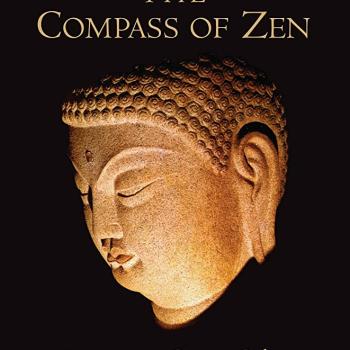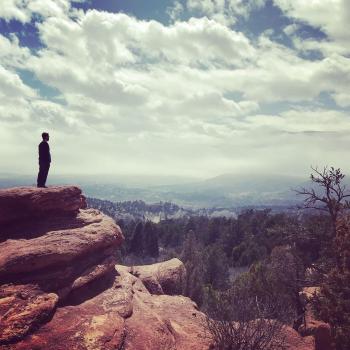Merely stagnating in duality,
How can you recognize oneness?
If you fail to penetrate oneness,
Both places lose their function.
When we make distinctions between this and that our minds enter duality. Even striving for Enlightenment is, in itself, something that can put us in a position of thinking about subject and object. We tend to think that the person who seeks Enlightenment is separate from the goal. In seeking to become like the Buddha, we often separate ourselves from him. We think of our goal as somewhere else instead of as something that’s with us here.
If we can put ourselves in the mind of seeing no separation, then we can reach the state of non-duality. That’s what we’re talking about in the title “Faith in Mind”. We have a faith in the ultimate non-duality of things, that we are one with the world around us.
Our main emphasis, though, is on practice, not speculation. The goal of our meditation practice, if there can be said to be a goal, is to come to a unified, or one pointed state of mind. If we can get to the point when we transcend thoughts, then we can dwell in stillness. This is where we come to see things as they really are.
Our practice has been described as progressing in a sequence: from scattered mind to simple mind, from simple mind to one mind, and from one mind to no mind.
We start by gathering our scattered thoughts into a more simple state of mind. Next we take our simple mind into the mind of unity, then we take the unified mind to the state beyond mind, beyond thoughts.
To pass from mind to the state of no mind doesn’t mean that we are losing anything. It means that we are free, we aren’t held back by our thoughts.
Banish existence and you fall into existence;
Follow emptiness and you turn your back on it
This is a challenge to stop us from being too goal oriented in our practice. We just practice and don’t think about Enlightenment all the time. We don’t overcome our delusions by fighting them. We overcome them by accepting and understanding them.
If we are struggling to overcome our delusions, then we are banishing existence and falling into existence.
“Follow emptiness and you turn your back on it.” refers to those experiences of awakening that we have on the path, when we think we are attaining Enlightenment we sometimes are manifesting attachment.
The Daodejing says “The Dao that can be spoken of is not the eternal Dao.”
That’s what we’re talking about here. Emptiness is not real Emptiness if we sit around philosophizing about how great the concept is. It’s something we have to experience ourselves by stilling our minds.
Excessive talking and thinking
Turn you from harmony with the Way.
Cut off talking and thinking,
And there is nowhere you cannot penetrate.
We like to talk a lot. Especially in Buddhist circles, people philosophize endlessly. We can talk and talk about things like Emptiness and Enlightenment without actually practice. There are plenty of armchair philosophers and I think there were plenty even in Sengcan’s time.
But this is about retreats. Our purpose, during our practice, is to be silent. We try to still our speech while we are stilling our minds. This is why retreats our silent. It’s hard to keep a still mind if you’re stopping for some chatter every few hours. This applies to shorter practice periods as well. We seem to talk too much, although these days it’s as often facebook and tweets as it is actual verbal chatter. When we are practicing we want to just practice.
It is only when words and thoughts stop that we manifest our innate Enlightenment. We transcend delusion by stilling the mind.
“there is nowhere you cannot penetrate” doesn’t really mean we’re trying to get anywhere. We’re already there. We can come to the state of no thought in any context. We just have to put down the delusion we are carrying.
Return to the root and attain the principle;
Pursue illumination and you lose it.
One moment of reversing the light
Is greater than previous emptiness.
It’s only by turning our focus within that we get to the meaning of things. When we look for awakening as something outside of ourselves, we run into trouble.
The root we are talking about is our Buddha nature. We return to it by letting go of the words and concepts, the attachment and aversion, that keeps us distracted all the time. When we transcend these distractions our true nature manifests.
The previous emptiness is transformed;
It was all a produce of deluded views.
No need to seek the real;
Just extinguish your views.
Sengcan is telling us the same thing over and over. The previous Emptiness is when we think of Enlightenment as something other, something away from ourselves that we are trying to get to. It’s hard to think in a different way because we really don’t feel very Enlightened. It’s even our attachment to concepts like Enlightened and ordinary that we have to give up.
Thinking “When am I going to get Enlightened?” can take us further away from our true nature. That’s why some of the sutras say, “No attainment and nothing to attain.”
We must simply strive forth with diligence and not try to achieve all the time.
Do not abide in dualistic views;
Take care not to seek after them.
As soon as there is right and wrong
The mind is scattered and lost.
Dualistic views refers to our mind that discriminates. These include doubts about our ability to practice, which many of us have. Too often when we’re on the cushion we might come up with the idea “my mind will never settle”. That is a dualistic view.
The fact of the matter is that we aren’t practicing to attain Enlightenment. We’re really practicing just to practice. If we can think of things in that way, then our practice is in good shape. If we struggle with that, we might be in trouble.
This aspect of right and wrong could, I think, be misunderstood. We’re talking about the mind puts labels on things, that tries to put the whole world into neat little categories.
The universe just doesn’t work that way. We put labels on things and then assume that those labels are real. We forget that we created them in the first place.
Two comes from one,
Yet do not even keep the one.
When one mind does not arise,
Myriad dharmas are without defect.
Our method, meditation practice, helps us focus our minds, to replace our constant discursive thoughts with clear thinking. After we have practiced for a long time, we reach the point where even the method itself disappears and we are able to just be, just to dwell in oneness.
The one that’s referred to in this section is our true nature, our inherent oneness. The Avatamsaka Sutra says: “With no exception everything comes from the Dharma Realm. With no exception everything will return to the Dharma Realm.” The Dharma Realm is Enlightenment.
Everything comes from Emptiness and returns to Emptiness. Everything is interdependent and we can come to an understanding of this.
We come to this state of oneness, and even that is said to drop away. And we come to the mind of no mind, the mind before thinking.
A famous Zen master named Wu Kwang once said, “Open mouth, already a mistake.” He’s saying, I think, that these concepts are so difficult at times, that even talking about them is usually a mistake. We should just practice.
Without defect, without dharmas,
No arising, no mind.
No arising is a state where we have control of our minds, where these discursive thoughts stop showing up all the time to distract us. It’s in this state that our practice can really take off.
The state beyond thought is where Enlightenment is.
The subject is extinguished with the object.
The object sinks away with the subject.
Our thoughts are illusory. They all depend on causes and conditions all the time. That’s what we’re talking about with subjects and objects. If there were not objects or symbols in our minds, then there would be no illusory thoughts.
Object is object because of the subject;
Subject is subject because of the object.
Know that two
Are already originally one emptiness.
In one emptiness the two are the same
Containing all phenomena.
This describes a mind that doesn’t discriminate. If we can dwell in awakening, then we can see things from the standpoint of Emptiness.
Everything absolutely depends on everything else. It’s hard to see things from that point of view, but it is the case.












